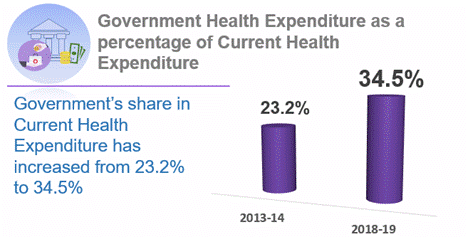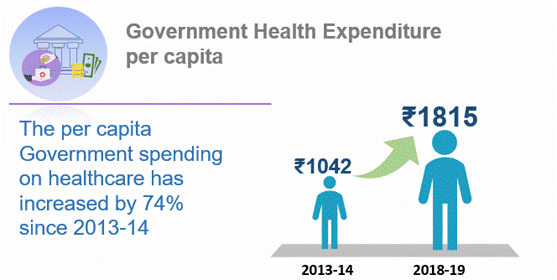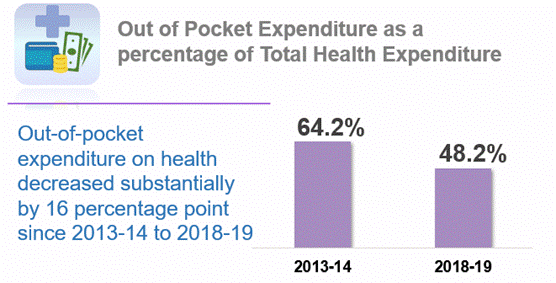Headlines of The Day
NHA shows effectiveness of govt’s increasing expenditure on healthcare
India’s National Health Accounts (NHA) estimates report for FY 2018-19 is the sixth in the series of NHA reports prepared by the National Health Systems Resource Centre (NHSRC). The report based on the globally accepted framework of System of Health Accounts, 2011, enables cross-comparability of estimates across time along with international comparisons. NHA estimates also facilitate efficient monitoring of expenditures within the health sector of the country for formulating and fine-tuning public policy.
 The NHA report presents two estimates for the expenditure incurred within the health sector during a financial year: Current health expenditure (CHE) and total health expenditure (THE). CHE includes the recurring expenses corresponding to the final consumption of health goods and services within a financial year. THE, on the other hand, reflects both current and capital expenditure incurred in the health sector within a financial year. Despite the volatile nature of the capital expenditure, it constitutes an integral part of the THE as it acts as an indicator of the future capacity of the health system of the country.
The NHA report presents two estimates for the expenditure incurred within the health sector during a financial year: Current health expenditure (CHE) and total health expenditure (THE). CHE includes the recurring expenses corresponding to the final consumption of health goods and services within a financial year. THE, on the other hand, reflects both current and capital expenditure incurred in the health sector within a financial year. Despite the volatile nature of the capital expenditure, it constitutes an integral part of the THE as it acts as an indicator of the future capacity of the health system of the country.
For FY 2018-19, the current expenditure on health is estimated at Rs 5.4 trillion (90.6 per cent of THE) while capital expenditure is estimated at Rs 56,194 crore (9.4 per cent of THE). Out-of-pocket expenditure (OOPE) remains the major constituent (53.2 per cent) of CHE. Over the years, a sustained declining trend in OOPE has been observed. Between 2013-14 and 2018-19, the share of OOPE in CHE declined by almost 16 percentage points, from 69.1 per cent in 2013-14 to 53.2 per cent in 2018-19. In comparison, government health expenditure has registered a sustained increased trajectory. Between 2013-14 and 2018-19, the share of government expenditure in CHE increased by more than 10 percentage points (from 23.2 per cent in 2013-14 to 34.5 per cent in 2018-19).
 The NHA report provides detailed and disaggregated information on expenditure incurred within the health sector of a country. According to the NHA 2018-19 report, after the household (60.1 per cent of CHE), a major source of funds for healthcare expenditure is the government with the state government’s share being 19.6 per cent in CHE and the Union government’s share being 11.7 per cent. Among the different types of healthcare providers, the major share of CHE is incurred at private hospitals (28.7 per cent), followed by pharmacies (22.6 per cent), and government hospitals (17.3 per cent). Among the different types of healthcare services, the majority of CHE is accrued in inpatient curative care (34.6 per cent), followed by pharmaceutical and other medical goods (22.5 per cent), and outpatient curative care (18.9 per cent).
The NHA report provides detailed and disaggregated information on expenditure incurred within the health sector of a country. According to the NHA 2018-19 report, after the household (60.1 per cent of CHE), a major source of funds for healthcare expenditure is the government with the state government’s share being 19.6 per cent in CHE and the Union government’s share being 11.7 per cent. Among the different types of healthcare providers, the major share of CHE is incurred at private hospitals (28.7 per cent), followed by pharmacies (22.6 per cent), and government hospitals (17.3 per cent). Among the different types of healthcare services, the majority of CHE is accrued in inpatient curative care (34.6 per cent), followed by pharmaceutical and other medical goods (22.5 per cent), and outpatient curative care (18.9 per cent).
 The decreasing share of OOPE both in overall share as well as in per-capita terms signals the declining incidence of financial hardships faced by households while accessing healthcare in India. A very positive development is the decreasing share of OOPE coupled with the increasing share of social security expenditure on health from 6 per cent in 2013-14 to 9.6 per cent of THE in 2018-19, indicating the increasing reach of social security measures in the country. This kind of payment mechanism enables risk protection thus preventing households from incurring catastrophic health expenditure.
The decreasing share of OOPE both in overall share as well as in per-capita terms signals the declining incidence of financial hardships faced by households while accessing healthcare in India. A very positive development is the decreasing share of OOPE coupled with the increasing share of social security expenditure on health from 6 per cent in 2013-14 to 9.6 per cent of THE in 2018-19, indicating the increasing reach of social security measures in the country. This kind of payment mechanism enables risk protection thus preventing households from incurring catastrophic health expenditure.
The current trends in the nature of the health expenditure in India, decreasing OOPE, increasing shares of government health expenditure and social security expenditure on health care vindicate the multiple steps taken by the Union government to increase access to healthcare services in the country. Recent initiatives such as Ayushman Bharat Pradhan Mantri Jan Arogya Yojana, earmarked health allocations under the 15th Finance Commission, infrastructural support under Pradhan Mantri Swasthya Suraksha Yojana (PMSSY), Pradhan Mantri Ayushman Bharat Health Infrastructure Mission (PM-ABHIM), etc. will further increase health investment in the country. Higher investment by the government, apart from improving the health system of the country, will prove instrumental in further decreasing the dependence on OOPE for accessing health services. Business Standard














